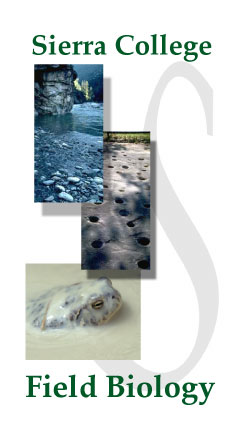![]()
![]()
Sierra College Field Studies Program
Field Study Programs
An Introduction to "How Do Field Classes Work?"
If you have never attended one of these field classes, this introduction is for you.
Probably first and most importantly, each class will be taught differently depending upon who is the instructor of the class, the purpose and objectives of the course, the nature of the site locations chosen for the class, as well as other factors. Yet, overall, there is a general pattern that might be helpful to share here. Again, this information is very general and may not apply at all to your class.
Limited Numbers
Most of the field classes have enrollment limits as to how many students may attend or enroll any specific class due to space, educational and other imposed limitations. If there is a field class you are particularly interested in, enroll early to insure a "seat" rather than waiting. Working in the field with large numbers of students is not the ideal, so the numbers are kept reasonable as needed. If you cannot add the class because it is already full, contact the instructor directly with your desire to add and with your contact information (phone, email, etc.). Some times as the class starts, students will fail to show and some instructors will add students during the first class meeting or even afterwards, if feasible and as space becomes available. Always attend the first class meeting and let the instructor know that you are interested and wanting to make the commitment to participate. Auditing these classes is generally not allowed.
Class Structure: Pre-seminar
Most field classes have the following structure: pre-seminar, field trip, and post-seminar. There is usually one pre-seminar or classroom session prior to the actual field trip, most often some evening. It usually occurs within a week or two of the departure date. If the field trip is a long one, the seminar may occur even further ahead of the trip. It is very important to attend the pre-seminar class meeting. By attending, you confirm your commitment to be an active student in the class and receive valuable information specifically about the class and field experiences as planned. You also have the opportunity to ask the instructor any questions that you might have as well as to listen to the questions of the other students. It is also your opportunity to meet the students that you will be living and working with for the duration of the trip. If for any reason you decide not to attend (drop the class), this would be the appropriate time to let the instructor know, if not before the seminar. Usually the instructor will include the class mechanics (grading, assignments, rules, and legal information), an introduction to the instructional topics, objectives and concepts, a description of where you will be going, and what camping and instructional tools you will need to bring. Usually toward the end of the seminar, time is given for students to form "food groups", groups for the purposes of sharing (and reducing) camping equipment and food preparation materials. Food groups usually make plans as to what to eat and who will do the shopping. It is a strong recommendation to get the names and contact information of everyone in your group before you leave the seminar.
Transportation is Provided
The College (District) provides transportation in almost every instance. You will be traveling by busses, vans or cars depending upon the class and the availability of vehicles. Assuming transportation is provided, you will not be allowed to travel separately; don't even ask if you can take your "own" car. There is a long list of reasons why that is a really bad idea, including insurance issues, high risk obligations, social problems and a loss of learning opportunities (to name just a few categories). By attending and traveling with the group, you will become more involved in the academic environment and will benefit in many distinct ways. Although it may feel like you are loosing some "freedom" to move about, you will gain much more from the interactions with others and be in a better position to share and learn from the observations and contributions of your fellow travelers. Everyone on the trip should be willing to work collaboratively as a team as they observe and study each day.
If the class travels out of the state, a transportation fee may be required to cover the majority of the transportation costs. That fee is usually stated in the Class Schedule and paid with your class registration fees. There may be variations on this theme as with any of the topics on this page. If the travel is within the state, there is usually no charge for transportation, but may have other charges for entrance fees, etc. Overall, what ever the charges are, they are likely to be much less than what it would cost you to do the same trip on your own.
Class Structure: Field Trip
The field trip for most field study classes is the primary event in the class. It is where most of the class time is spent, and where most of the instruction and learning occurs. As a few students have asked, "if I miss the trip, how can I make it up?"; you can't so, please, don't miss the "bus". Many of your instructors have spent years in the field, and they have a specific itinary of activities to accomplish and locations to visit in the during the short time you have together. They have chosen locations to illustrate concepts and provide your class with an overall picture of the course topic(s), using the real-life examples to demonstrate the points. Often students will enjoy one location or activity over another, but try and remember that this is a group event and the trip is planned to meet the educational goals of everyone and objectives of the course you have enrolled in. If you start feeling that you wanted to stay longer at a specific location, realize that to a large extent, the field class is an introduction or survey of the locations and topics of importance. If you had stayed there longer, some other location or activity would have been cut from the itinerary, and now that you know more about these places, perhaps you can return on your own and stay longer.
It is most important for the success of a field trip that all participants do all of the following: (1) have a great time learning, (2) be dedicated and interested in learning what the course offers, (3) participate fully in each activity as feasible, (4) assist each other and the instructor(s) with all of the aspects, tasks and activities of the trip, and (5) be positive, flexible and enthusiastic even if the pace and living accommodations are less than you deserve. One of those old "sayings" definitely applies here, "you get back what you are willing to put in to it." If you are going for any reason other than to learn and be part of the field study "learning community", consider taking a vacation on your own or with friends instead. On a related note, many of us have visited Yosemite or some other location with friends or family, perhaps often. But, going there as part of a field study program with 15-24 other students dedicated to observe, study and learn is a different and very rewarding experience. You will "see" much more than you were aware of from your personal visits. Enjoy the trip, accept the group involvement and learn.
Other Fees and Costs
There is some times discussion concerning the overall costs of the field program. Regardless of how you compare the costs, any and all classes that the college offers are costly events, undertaken and offered to you for your benefit. Make the most of these programs and opportunities. Departments offer field classes and trips because of their tremendous "learning" return or value to to those that participate and to the overall suite of offerings that lead to degrees or certificates. In addition to your class (unit based) registration fees and possible transportation fees, entrance and other related fees directly associated with your class may be requested. Please pay them, if at all feasible. If there are additional fees, usually the instructor will explain what you are paying for during the pre-seminar. Typical costs might include entrance fees to museums, special activities, scheduled events, state parks. The fees should equal the amount the group is charged by the organization, business or place involved. With group rates, usually the fees will be less than you would have had to pay if you were on your own, another potential benefit of attending a field class.
Class Structure: Post-Seminar
The post seminar or session is usually the last formal class session. There is not always a post-session, and it is not required to be the last class meeting. Some instructors include this session in the schedule to provide students time to complete assignments (notebooks, papers, etc.) and, therefore, use this as the deadline to submit student work. In addition, the instructor may use the time to wrap-up any instructional points they would like to make. Often, it is a time for the group to share the experience in the form of pictures and informal discussions or wrap-up any other class business.
Grading and Assignments
Grading and assignments (or what's required) will vary greatly depending upon the teacher and course purpose. Often students are required to have a class notebook (field notes). Often this takes the form of a journal where the student records the details and concepts of the class. Field lectures, driving directions, locations, weather, dates, field observations (outdoor or in museums, etc.), photographs, sketches, maps, personal notes, reactions and thoughts may all be included in the list of what is recorded. Some instructors want the notes to be accurate enough that someone else could take the notes and recreate the trip, successfully going to the locations described. Again, the instructor should detail to you what is required. In addition, many instructors will add a group or individual project or paper to be completed for extra credit or as a required assignment. Again, this depends upon the course and instructor. If field notes are required and you have never done this, ask the instructor if they can show you an example of one, in order that you will understand better what is required.
Grading usually involves participation combined with these assignments. Again, if you miss the trip, you will most likely not have an opportunity to complete the required assignments. Grades will be based on a variety of features, similar to a regular classroom based class.
For More Information
Please contact the specific instructor for additional information or to learn how your class will be conducted. If you have questions, generally you do not need to wait for the class to start to contact the instructor. Remember (the disclaimer) that this information is very general and may or may not be helpful depending on the instructor and class.


Copyright 2004 Sierra College Biological Sciences Department
Last updated: 10/05/04.
![]()
![]()